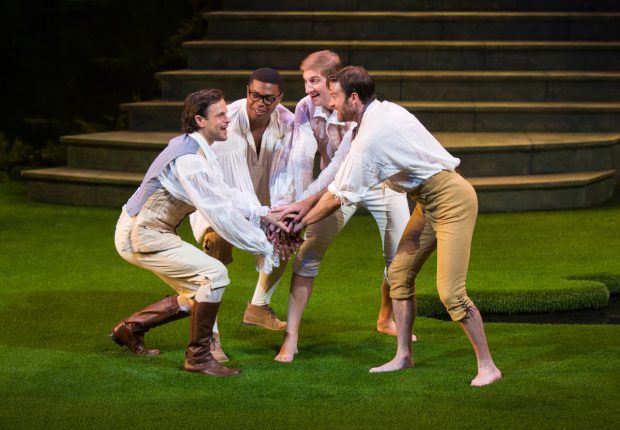Love's Labor's Lost

(© Jim Cox)
Already a master at showcasing Broadway's golden age of musicals to their greatest effect, Kathleen Marshall has set her eyes this summer on her first production of a Shakespeare play that isn't a musical adaptation. To mark the occasion, the Tony Award-winning director and choreographer is working out of town and throwing a garden party.
And quite a garden the Old Globe Theatre's Festival Stage proves to be for Marshall's rendition of the thorny comedy Love's Labor's Lost. The teeming greenery of John Lee Beatty's set climbs up ivy-covered columns, surrounding a grassy clearing that resembles a rococo fairway. A stairway ascends to an enormous set of gates that, in a different context, could lead to heaven. The inspiration, Marshall writes in her program notes, is the 18th-century landscape of Boucher, Watteau, and Fragonard. Indeed, when the lords of Navarre and the ladies of France start getting frisky, people start climbing trees or vaulting out on swings disguised by those hidden ivy bowers.
Giddiness — this Love's Labor's Loss possesses it aplenty, especially among the King of Navarre (Jonny Orsini) and his courtiers, who break their monastic vow before the ink is dry on their proclamation. The resolution of the king and his companions — Berowne (Kieran Campion), Longaville (Nathan Whitmer), and Dumain (Amara James Aja) – to devote three years to study while forsaking the company of women sets the plot in motion, since all four men have forgotten that they must entertain the visiting Princess of France and her equally lovely ladies-in-waiting. Somewhere else in the kingdom, the buffoonish Spanish night Don Adriano de Armado (Triney Sandoval) pines for the dairy maid Jaquenetta (Makha Mthembu), who is getting frisky with the servant Costard (Greg Hildreth). About the only people who are not in love are the pompous schoolteacher Holofernes (Stephen Spinella) and the curate Sir Nathaniel (Patrick Kerr).
Revelry and high jinks notwithstanding, Marshall's production is no light comic romp. Between the very real suffering experienced by Don Armado, and the linguistic gymnastics of Holofernes, Sir Nathaniel, and Armado, words can seriously mar a good time.
That's true for the royalty as well. Though they are taken by the attentions of their hosts, neither the visiting Princess of France (a witty and sly Kristen Connolly) nor her ladies seem to be particularly enjoying this game of love. As the two most eloquent lovers, Campion's Berowne and Pascale Armand's Rosaline almost feel like they are fighting against their mutual attraction rather than embracing it. This is effective at least initially since Armand's Rosaline is clearly trying to reconcile parallel feelings of distrust and love. Campion, meanwhile, downplays Berowne's braggadocio, at least among the men. With Rosaline, ultimately, he's content to be exposed as a man who does not have all the answers.
Love's Labor's Lost, as scholars have been pointing out for centuries, is meanderingly plotted with interludes taking up great stretches of time simply because they can. The Armado-Costard-Holofernes storylines are as engaging as the love games in no short measure because of who is doing the shticks. A white-haired, bushy-eye-browed Spinella shrieks with pomposity as the schoolmaster who must have words pronounced correctly. Sandoval mugs gloriously as Armado, and as the unapologetically bawdy servant Costard, Hildreth suggests a young Nathan Lane. With his pulverizing sassiness and penchant for groping men, Kevin Cahoon as the attendant Boyet seems like he wandered in from another century.
Marshall has left the text largely intact, which makes for a longish evening. The pageant of the Nine Worthies, while quite humorous, is more an opening for the lords and ladies to display their nastiness. As the revels wind down and a messenger arrives with a distressing bit of news, the four couples finally seem to realize the fleetingness of life, the need to dispense with wordplay, and the importance of making a commitment. Marshall treats the scenes of the men disguised as Muscovites — they're immediately exposed — and the Nine Worthies pageants as largely comic interludes. Both scenes are very different in tone from the event in Act 5 that brings the four couples together.
Or does it? Where love is concerned, Shakespeare's play ends on an ambiguous note. Marshall concludes her production gloriously, with a bittersweet song, and some deeply felt embraces among those four couples, who may pick up their amorous battle in a year's time. Here's hoping that Marshall doesn't wait that long to take up Shakespeare again.











